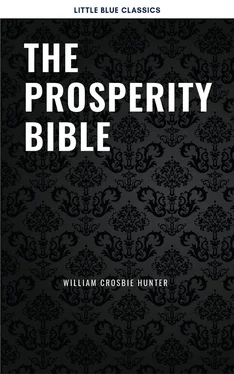–R.L. Stevenson, A Gossip on Romance .
FROM "MIDNIGHT IN LONDON"
Clang! Clang! Clang! the fire-bells! Bing! Bing! Bing! the alarm! In an instant quiet turns to uproar—an outburst of noise, excitement, clamor—bedlam broke loose; Bing! Bing! Bing! Rattle, clash and clatter. Open fly the doors; brave men mount their boxes. Bing! Bing! Bing! They're off! The horses tear down the street like mad. Bing! Bing! Bing! goes the gong!
"Get out of the track! The engines are coming! For God's sake, snatch that child from the road!"
On, on, wildly, resolutely, madly fly the steeds. Bing! Bing! the gong. Away dash the horses on the wings of fevered fury. On whirls the machine, down streets, around corners, up this avenue and across that one, out into the very bowels of darkness, whiffing, wheezing, shooting a million sparks from the stack, paving the path of startled night with a galaxy of stars. Over the house-tops to the north, a volcanic burst of flame shoots out, belching with blinding effect. The sky is ablaze. A tenement house is burning. Five hundred souls are in peril. Merciful Heaven! Spare the victims! Are the engines coming? Yes, here they are, dashing down the street. Look! the horses ride upon the wind; eyes bulging like balls of fire; nostrils wide open. A palpitating billow of fire, rolling, plunging, bounding rising, falling, swelling, heaving, and with mad passion bursting its red-hot sides asunder, reaching out its arms, encircling, squeezing, grabbing up, swallowing everything before it with the hot, greedy mouth of an appalling monster.
How the horses dash around the corner! Animal instinct say you? Aye, more. Brute reason.
"Up the ladders, men!"
The towering building is buried in bloated banks of savage, biting elements. Forked tongues dart out and in, dodge here and there, up and down, and wind their cutting edges around every object. A crash, a dull, explosive sound, and a puff of smoke leaps out. At the highest point upon the roof stands a dark figure in a desperate strait, the hands making frantic gestures, the arms swinging wildly—and then the body shoots off into frightful space, plunging upon the pavement with a revolting thud. The man's arm strikes a bystander as he darts down. The crowd shudders, sways, and utters a low murmur of pity and horror. The faint-hearted lookers-on hide their faces. One woman swoons away.
"Poor fellow! Dead!" exclaims a laborer, as he looks upon the man's body.
"Aye, Joe, and I knew him well, too! He lived next door to me, five flights back. He leaves a widowed mother and two wee bits of orphans. I helped him bury his wife a fortnight ago. Ah, Joe! but it's hard lines for the orphans."
A ghastly hour moves on, dragging its regiment of panic in its trail and leaving crimson blotches of cruelty along the path of night.
"Are they all out, firemen?"
"Aye, aye, sir!"
"No, they're not! There's a woman in the top window holding a child in her arms—over yonder in the right-hand corner! The ladders, there! A hundred pounds to the man who makes the rescue!"
A dozen start. One man more supple than the others, and reckless in his bravery, clambers to the top rung of the ladder.
"Too short!" he cries. "Hoist another!"
Up it goes. He mounts to the window, fastens the rope, lashes mother and babe, swings them off into ugly emptiness, and lets them down to be rescued by his comrades.
"Bravo, fireman!" shouts the crowd.
A crash breaks through the uproar of crackling timbers.
"Look alive, up there! Great God! The roof has fallen!"
The walls sway, rock, and tumble in with a deafening roar. The spectators cease to breathe. The cold truth reveals itself. The fireman has been carried into the seething furnace. An old woman, bent with the weight of age, rushes through the fire line, shrieking, raving, and wringing her hands and opening her heart of grief.
"Poor John! He was all I had! And a brave lad he was, too! But he's gone now. He lost his own life in savin' two more, and now—now he's there, away in there!" she repeats, pointing to the cruel oven.
The engines do their work. The flames die out. An eerie gloom hangs over the ruins like a formidable, blackened pall.
And the noon of night is passed.—Ardennes Jones-Foster.
QUESTIONS AND ANSWERS
1. Write two paragraphs on one of these: the race horse, the motor boat, golfing, tennis; let the first be pure exposition and the second pure description.
2. Select your own theme and do the same in two short extemporaneous speeches.
3. Deliver a short original address in the over-ornamented style.
4. ( a ) Point out its defects; ( b ) recast it in a more effective style; ( c ) show how the one surpasses the other.
5. Make a list of ten subjects which lend themselves to description in the style you prefer.
6. Deliver a two-minute speech on any one of them, using chiefly, but not solely, description.
7. For one minute, look at any object, scene, action, picture, or person you choose, take two minutes to arrange your thoughts, and then deliver a short description—all without making written notes.
8. In what sense is description more personal than exposition?
9. Explain the difference between a scientific and an artistic description.
10. In the style of Dickens and Irving (pages 234, 235), write five separate sentences describing five characters by means of suggestion—one sentence to each.
11. Describe a character by means of a hint, after the manner of Chaucer (p. 235).
12. Read aloud the following with special attention to gesture:
His very throat was moral. You saw a good deal of it. You looked over a very low fence of white cravat (whereof no man had ever beheld the tie, for he fastened it behind), and there it lay, a valley between two jutting heights of collar, serene and whiskerless before you. It seemed to say, on the part of Mr. Pecksniff, "There is no deception, ladies and gentlemen, all is peace, a holy calm pervades me." So did his hair, just grizzled with an iron gray, which was all brushed off his forehead, and stood bolt upright, or slightly drooped in kindred action with his heavy eyelids. So did his person, which was sleek though free from corpulency. So did his manner, which was soft and oily. In a word, even his plain black suit, and state of widower, and dangling double eye-glass, all tended to the same purpose, and cried aloud, "Behold the moral Pecksniff!"
–Charles Dickens, Martin Chuzzlewit .
13. Which of the following do you prefer, and why?
She was a blooming lass of fresh eighteen, plump as a partridge, ripe and melting and rosy-cheeked as one of her father's peaches.—Irving.
She was a splendidly feminine girl, as wholesome as a November pippin, and no more mysterious than a window-pane.
–O. Henry.
Small, shining, neat, methodical, and buxom was Miss Peecher; cherry-cheeked and tuneful of voice.—Dickens.
14. Invent five epithets, and apply them as you choose (p. 235).
15. ( a ) Make a list of five figures of speech; ( b ) define them; ( c ) give an example—preferably original—under each.
16. Pick out the figures of speech in the address by Grady, on page 240.
17. Invent an original figure to take the place of any one in Grady's speech.
18. What sort of figures do you find in the selection from Stevenson, on page 242 ?
19. What methods of description does he seem to prefer?
20. Write and deliver, without notes and with descriptive gestures, a description in imitation of any of the authors quoted in this chapter.
21. Reëxamine one of your past speeches and improve the descriptive work. Report on what faults you found to exist.
Читать дальше












